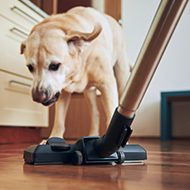Common household noises can cause dogs anxiety - study finds

"Dogs use body language much more than vocalizing and we need to be aware of that" - Emma Grigg, lead author.
Common household noises can cause dogs more stress than humans interpret, a new study from the University of California, Davis (UC Davis) has discovered.
Published in Frontiers in Veterinary Science, the study, entitled 'Stress-Related Behaviors in Companion Dogs Exposed to Common Household Noises, and Owners' Interpretations of Their Dogs' Behaviors', discovered that people may not recognise that their dog is stressed when exposed to common household noises.
Researchers conducted a survey of 386 dog owners about their dogs' responses to household sounds, such as vacuum cleaners and microwaves, and examined recorded dog behaviours and human reactions from 62 online videos.
The study found that the owners of dogs exhibiting signs of stress over household noises underestimated the dogs' fearful, and the majority of owners studied responded with amusement rather than concern.
Lead author Emma Grigg said in a news release by UC Davis: “There is a mismatch between owners’ perceptions of the fearfulness and the amount of fearful behavior actually present. Some react with amusement rather than concern.
“We hope this study gets people to think about the sources of sound that might be causing their dog stress, so they can take steps to minimize their dog’s exposure to it.
“Dogs use body language much more than vocalizing and we need to be aware of that.
“We feed them, house them, love them and we have a caretaker obligation to respond better to their anxiety.”



 The latest
The latest